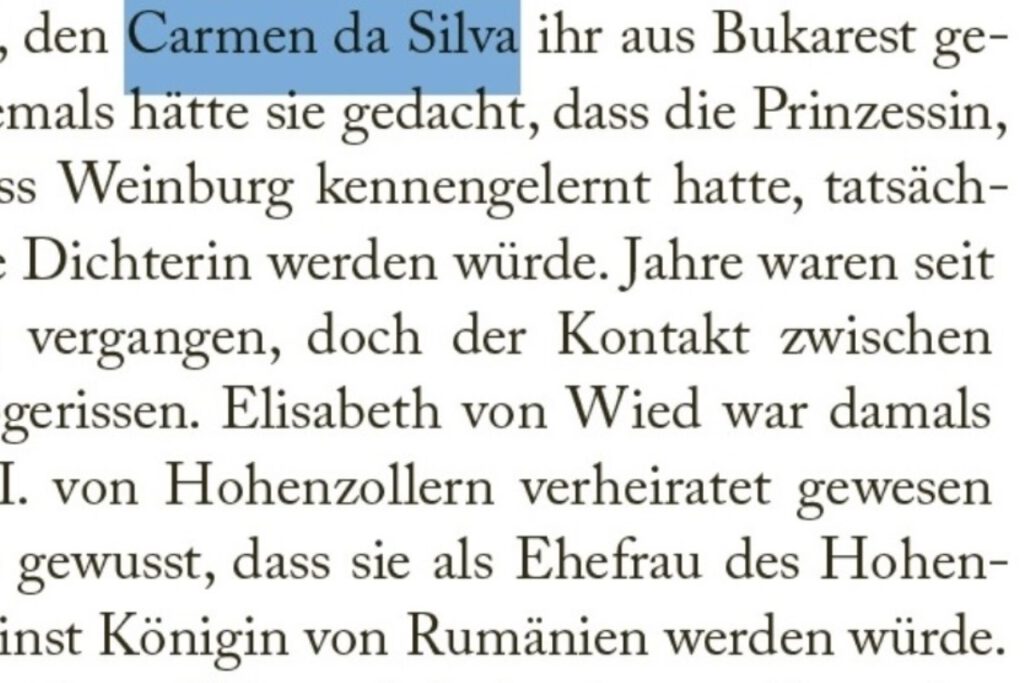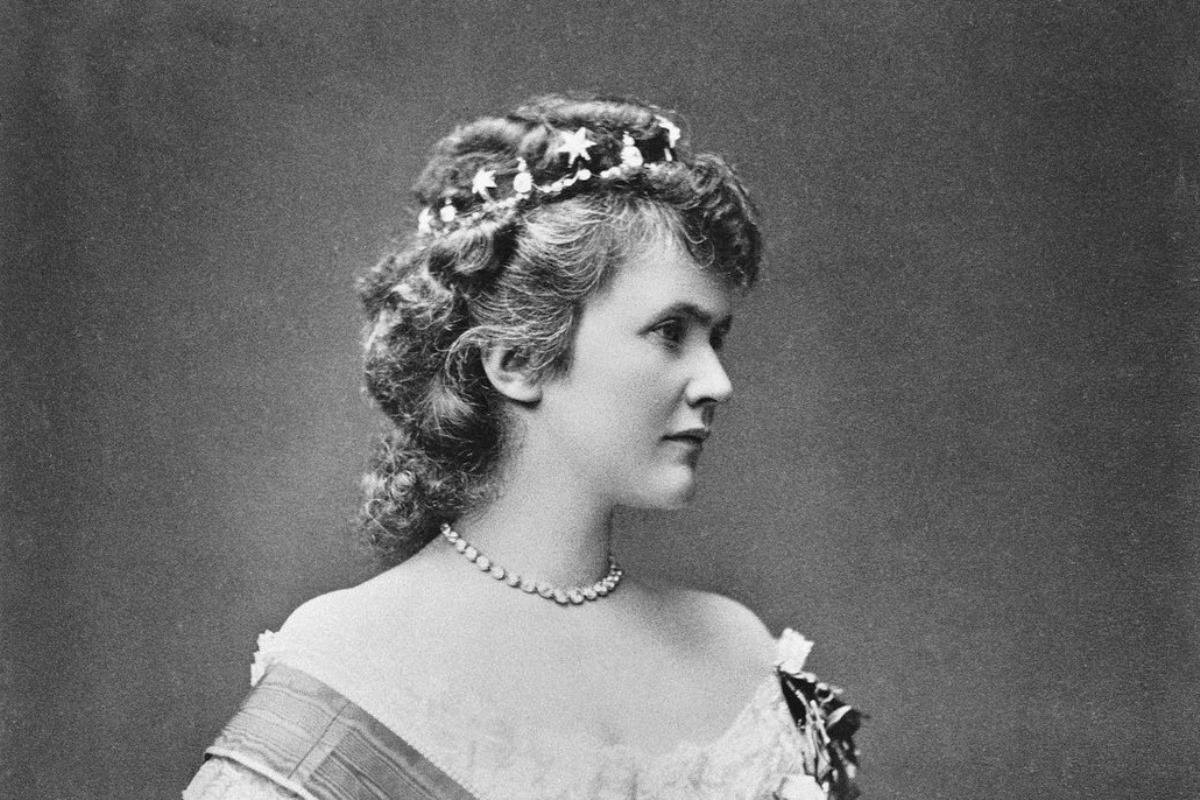In meinem Roman „Die Königin von der Ruhr“ habe ich die Schreibweise des Namens dieser Schriftstellerin, von der ich noch nie gehört hatte, aus den Briefen von Margarethe Krupp übernommen: Carmen da Silva. Der Name ist ein Pseudonym, das korrekt wohl Carmen Sylva lautet, für Prinzessin Elisabeth Pauline Ottilie Luise zu Wied. Sie wurde am 29. Dezember 1843 als Tochter des Fürsten Hermann zu Wied geboren und hat schon in ihrer Jugend Geschichten und Gedichte geschrieben.
Sie wäre gerne Lehrerin geworden, allerdings war das für ihren Stand zu jener Zeit undenkbar. Immerhin erhielt sie, anders als die Mädchen aus unteren Ständen in jener Zeit, Unterricht durch einen Hauslehrer und sogar Klavierstunden von Clara Schumann. Mit 25 Jahren heiratete sie einen Prinzen aus dem Haus Hohenzollern, Karl Eitel Friedrich von Hohenzollern-Sigmaringen, und folgte ihm nach Bukarest, wo sie als Fürst und Fürstin herrschten, bis Karl 1881 m König von Rumänien gekrönt wurde, was aus Elisabeth eine Königin machte. Das hinderte sie jedoch nicht, ihre Schreibleidenschaft fortzuführen. Vor allem nach dem Tod ihrer kleinen Tochter Marie, die 1874 mit vier Jahren verstarb. Sie schrieb Gedichte, Kurzgeschichten, Märchen und Romane und übersetzte Literatur aus dem Französischen ins Deutsche. Das trug ihr in Rumänien den Kosenamen „die dichtende Königin“ ein. Manche Texte verfasste sie zusammen mit ihrer Hofdame Mite Kremnitz und dem Schriftsteller Bruno Wille. Wie verbreitet ihre Bücher waren, lässt sich nicht mehr ermitteln, im Portal für rheinische Geschichte heißt es, dass ihre Gedichte sehr beliebt und verbreitet waren, vor allem die mit Lokalbezug. Einer ihrer Gedichtbände wurde immerhin von der Académie Française ausgezeichnet wurde. In folgendem Gedicht erklärt sie ihr Pseudonym:
Carmen das Lied und Sylva der Wald,
Von selbst gesungen das Waldlied schallt.
Und wenn ich am Wald nicht geboren wär‘,
Dann säng‘ ich die Lieder schon längst nicht mehr.
Dan Vögeln hab‘ ich sie abgelauscht;
Der Wald hat alles mir zugerauscht,
Vom Herzen tat ich den Schlag dazu,
Mich singen der Wald und das Lied zur Ruh!
(Zit. n. www.rheinische-geschichte.de)

Ich wurde auf die Schriftstellerin aufmerksam, weil es einen Briefwechsel mit Margarethe Krupp gab und diese immer die neuesten Gedichtbände bekam. Sie muss Carmen da Silva, wie sie sie nannte, als junges Mädchen kennengelernt haben, als sie mit ihrem Arbeitgeber auf dem Sommersitz der Familie Hohenzollern war, wo sich auch Prinz Karl mit seiner Frau aufgehalten haben.
Als Königin war sie wie ihresgleichen in zahlreiche karitative Projekte in Rumänien und später auch im Rheinland involviert. Spannend finde ich ihre Idee, eine Blindenstadt zu gründen, die sie „Vatara Luminoasa“ (Leuchtender Herd) genannt hätte. Das Projekt wurde nicht realisiert, aber es zeigt, wie kreativ die dichtende Königin gewesen ist. Sie starb am 2. März 1916, vielleicht liegt es auch daran, dass sie keine Nachfahren hat, dass ihr Werk vergessen ist. Anders als zu Helene Leven-Intze gibt es einige Porträts im Internet und dort wird auch teilweise auf Artikel in Büchern und Zeitschriften verwiesen und das Fürstlich Wiedisches Archiv hat sogar eine Forschungsstelle zu Carmen Sylva, wo auch einige Veröffentlichungen über sie erschienen sind. © März 2024 Dr. Birgit Ebbert www.vergessene-frauen.de – www.birgit-ebbert.de

Carmen Sylva in meinem Roman „Den Traum im Blick“
Links zu Elisabeth zu Wied alias Carmen Sylva
Porträt im Portal Rheinische Geschichte
Porträt auf der Seite der Rheinland-Pfälzischen Landesvertretung
Carmen Sylva in der Gutbenberg-Bibliothek
Werke von Carmen Sylva in der Deutschen Digitalen Bibliothek
Hörbuch-Lesung eines Märchens für Erwachsene von Carmen Sylva
Zwei Werke von Carmen Sylva auf gutenberg.de
Werke von Carmen Sylva in der Open Library
Das Titelfoto stammt von wikicommons und ist gemeinfrei.
